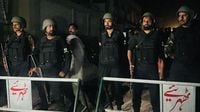In a significant military operation early on Wednesday, May 7, 2025, the Indian Armed Forces executed 'Operation Sindoor', targeting nine terrorist camps in Pakistan and Pakistan-occupied Kashmir. This decisive action comes in retaliation for the recent Pahalgam terror attack, which claimed the lives of 26 individuals, primarily tourists. The operation was characterized by precision strikes aimed at specific terrorist infrastructure, reflecting India's commitment to countering cross-border terrorism.
The strikes were confirmed by the Indian Army in a statement released at 1:44 AM IST. The operation was named 'Sindoor' as a tribute to the women who lost their husbands in the tragic attack on Hindu tourists in Pahalgam last month. The term 'Sindoor' refers to the traditional red vermilion worn by married Hindu women, symbolizing protection and marital commitment.
Prime Minister Narendra Modi closely monitored the operation throughout the night, receiving real-time updates from senior military officials, including the Chief of Defence Staff and National Security Advisor Ajit Doval. The targeted locations included Bahawalpur, a known stronghold of the Jaish-e-Mohammad terror group, and Muridke, associated with the Lashkar-e-Taiba. The Ministry of Defence emphasized that the strikes were focused and measured, avoiding any Pakistani military facilities, which demonstrates India's restraint in its military engagements.
According to the Ministry of Defence, the operation involved advanced military technology, including kamikaze drones—also known as loitering munitions—capable of striking with precision. The strikes were executed by a coordinated effort from the Indian Army, Navy, and Air Force, showcasing a unified military strategy against terrorism.
In the wake of the strikes, flight operations in the northern region of India were impacted, with the largest airline, IndiGo, announcing that no civil flights would operate from or to Srinagar airport on the day of the operation. Flight tracking service Flightradar24 reported that most international flights overflying Pakistan were diverted away from its airspace, underscoring the heightened tensions in the region.
The Indian Embassy stated that the actions taken were designed to be non-escalatory, with no civilian or economic targets being hit. Instead, the focus was solely on known terror camps. "India’s actions have been focused and precise. They were measured, responsible and designed to be non-escalatory in nature," the embassy noted. The statement also pointed out Pakistan's denial regarding the existence of terrorist infrastructure and its allegations of false flag operations against India.
In addition to military actions, India's diplomatic channels were activated immediately following the operation. Senior Indian officials reached out to their counterparts in the United States, United Kingdom, Russia, Saudi Arabia, and the United Arab Emirates to inform them about the operation and reinforce India's stance on holding perpetrators of terrorism accountable.
The operation has drawn mixed reactions internationally, with some nations expressing support for India's right to defend itself against terrorism. Meanwhile, Pakistan has vehemently denied any wrongdoing, insisting that India’s claims are unfounded and merely a cover for its military aggression.
As the situation continues to develop, a detailed briefing on 'Operation Sindoor' was scheduled for later on May 7, 2025, where military officials are expected to provide further insights into the operation's execution and its implications for regional security.
In summary, 'Operation Sindoor' marks a significant escalation in India's military response to terrorism emanating from Pakistan. The operation not only highlights India's strategic military capabilities but also its ongoing commitment to ensuring the safety of its citizens amid rising tensions in the region. The international community watches closely as the dynamics between India and Pakistan evolve following this latest confrontation.






